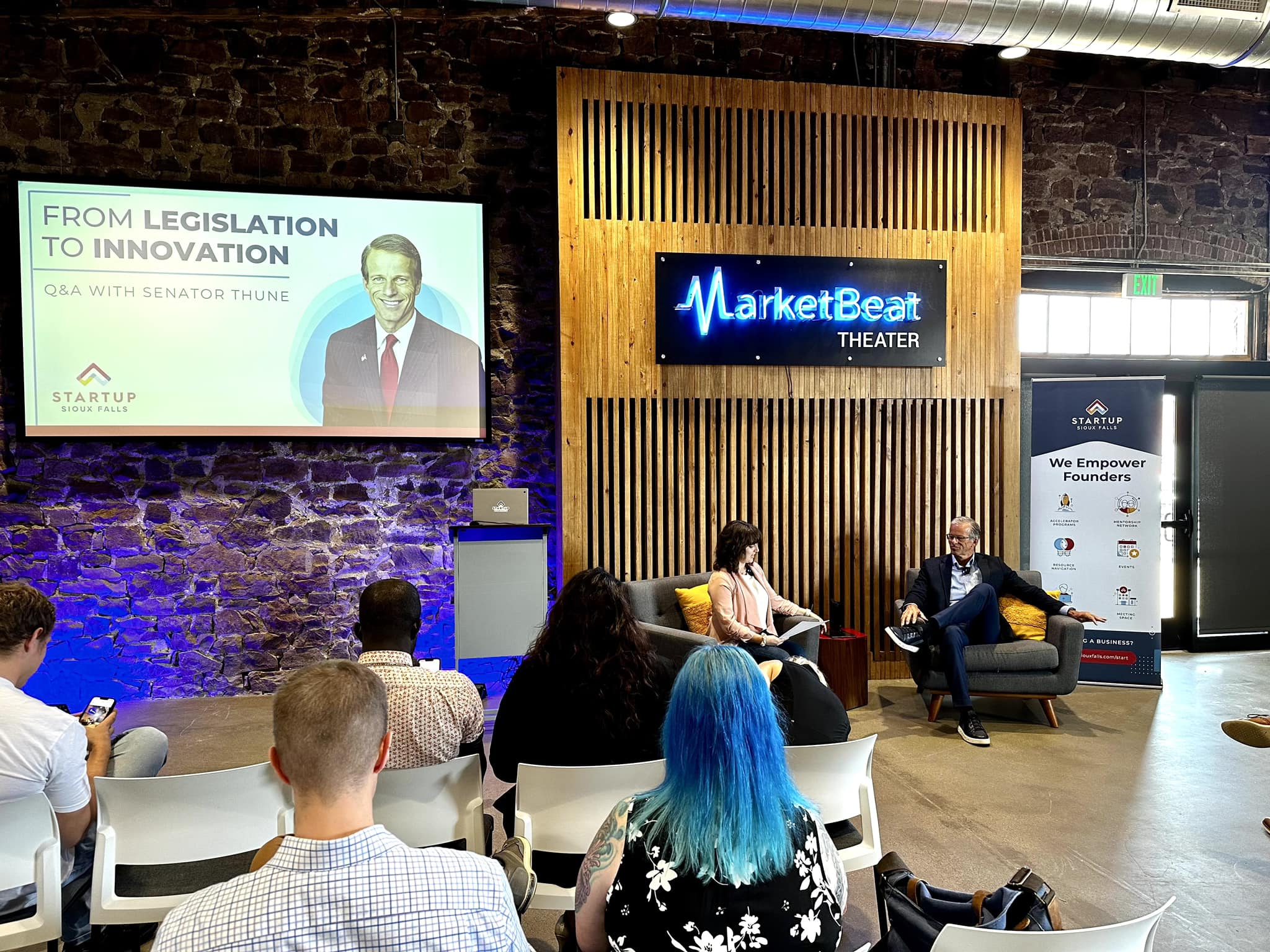Senate Minority Whip and fourth-term Senator John Thune visited Startup Sioux Falls on Tuesday to discuss a range of topics from artificial intelligence to interest rates to how the federal government can help support entrepreneurs and small businesses. Here’s a summary of the conversation, and learn more about upcoming Startup Sioux Falls events here.
Answers have been edited for length. This is an excerpt of a longer conversation with Sen. John Thune that took place at Startup Sioux Falls earlier this week.
Senator, you’re obviously a very busy guy. Why did you want to spend your time here this morning with Startup Sioux Falls? What are you hoping to glean from our conversation here today?
Thune: Congress is out of session, (That’s usually an applause line), and so it’s a chance for us to get around the state … I always learn more when I listen than when I’m talking, and this obviously is a community that is very much the heartbeat of this community, Sioux Falls, and the broader region.
- So I appreciate the chance to interact with and find out what’s in the hearts and minds of people who are difference-makers in our communities and looking for places where they can be impactful and really be purpose-driven.
How do you see an ecosystem like Startup Sioux Falls contributing to economic development both in the region and in the broader state of South Dakota?
Thune: I think it’s really important because it can be an engine, a conduit if you will, for job creation and investment in growth.
- Every community wants to expand and offer a better quality of life to the people who live there, and in order to do that you have to be an attractive place to start businesses and to work and to live. I think the investment that Sioux Falls has made in so many things in this community have made it kind of a magnet.
- I think the value of a community like this is you can come in you can bounce ideas off of each other. Most of life really does come down to relationships, so I think a setting like this creates a place where those ideas can be tested and shaped by the input that you get from the people around you.
As we look to the future, a lot of industries are seeing major changes/shifts/pivots with ever-changing technology, the advent of artificial intelligence, and more. What role should startups and small businesses play in preparing for that future? What role does the federal government play?
Thune: I grew up in Murdo, and we didn’t have cell phones. A big day for us was going to Pierre because they had a Taco John’s and a movie theater.
Nowadays, there’s a connectivity that’s transformative. The investment that’s being made in building out broadband, high speed internet networks is creating opportunities for people in rural places – the Murdos of the world – to start businesses.
- So technology is transformative on so many levels, and I would say that AI has similar potential. It has enormous potential upside on so many levels, but also some very potential harmful impacts. And so I think trying to figure out as a policy maker, how do you create a framework that creates guardrails around particularly the most risky parts of artificial intelligence, and so we’ve been working on that.
At the entrepreneur level, I think it's coming up with some amazing applications of the technology and figuring out how do I use this? How do I apply it in a way that creates hopefully a path to a business that can prosper and grow but also hopefully benefit the people around me?
I do think there's probably something that happens legislatively in congress although I don't think it happens this year.
- We actually have a set of principles that we’ve been vetting with stakeholders. We haven't really rolled it out yet, but a lot of people are thinking through it.
Through the Small Business Association (SBA) Community Navigator Pilot Program, Startup Sioux Falls was awarded $1 million to work with several community organizations as partners to expand our CO.STARTERS business accelerator program to support underserved communities.
- This was a government program that provided direct support to assist people in starting small businesses. With programs like this, where does the federal government stop and private investment start?
Thune: The SBA has a number of different programs … and so I'm glad that we are able to utilize and take advantage of that here but where are those lines?
- Ultimately, government doesn’t allocate capital in the most efficient way. The private economy does that.
- I think, in the end, there’s always a balance there, but I get uncomfortable if the government becomes too involved, too engaged to where they start affecting the decision making in businesses that I think is better made by the entrepreneur themselves or the business themselves. I think you have to be careful there.
Given the current economic conditions, it can be challenging to raise capital and get that early stage funding needed to start a business. One of the concerns is rising interest rates, what are you and other folks in congress doing to curb those rising rates?
Thune: What drove the rising interest rates – and hopefully they’re topping out – is inflation … the economy was flooded through Covid, and then the American Rescue Plan threw dollars on top of it. And we got into a situation where there was so much demand out there, so what does the (Federal Reserve) do, well it says we need to get inflation under control, that’s our job and the way we do that is raising interest rates.
- But you're right, it has a big impact not only on businesses but on home ownership, vehicle ownership, everything else.
- In order to get our arms around that we’ve got to make sure that the government is exercising restraint fiscally and then at the same time we’ve got pro-growth policies in place, and that’s tax policy, regulatory policy.
A lot of business owners, we’re pretty far away from Washington D.C., but what should the relationship look like between small business owners, entrepreneurs and their elected officials?
Thune: Hopefully it’s a partnership. I want to be, as an elected official at the federal level, a good partner with our communities, with state and local governments and with organizations like Startup Sioux Falls that are passionate about making this a place that's attractive to live.
Do you have any advice for local business owners and entrepreneurs on how to engage with local government?
Thune: I think what you guys are doing here at Startup Sioux Falls is a great way to be engaged. It’s developing a community where you can sharpen each other and your ideas. … I would just encourage people to think about your relationships: be constructive, be engaged, be thoughtful and be honest.
Is there anything else that arose for you in this conversation, or are there any final thoughts you want to leave us with?
Thune: There’s an old saying that good judgment comes from experience, and experience comes from bad judgment.
- I think the degree that you can avoid bad judgment by getting input from other people and being engaged in a community where you are given an opportunity to refine your ideas and create a process where you become better, your organization becomes better. I think that's kinda what hopefully the end game is for us, and kinda what leadership’s all about.
I just congratulate you on the success you've all had and encourage you to keep going. And let us know how we can be helpful.


